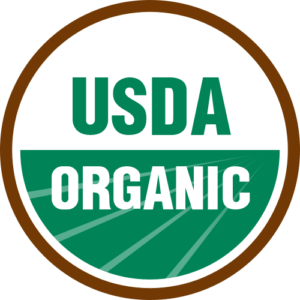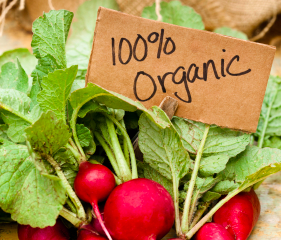People ask me all the time why it’s better to buy organic. Hopefully this list will help to clarify some of the most important reasons!
What is organic?
Organic production is based on a system of farming that maintains and replenishes soil fertility without the use of toxic and persistent pesticides and fertilizers. Organically produced foods also must be produced without the use of antibiotics, synthetic hormones, genetic engineering and other excluded practices, sewage sludge, or irradiation. (Source: Organic Trade Association (OTA)
Got it? Great. Here are some of the best reasons to buy organic, according to the OTA:
- Organic produce meets stringent standards. Organic certification is the public’s assurance that products have been grown and handled according to strict procedures without toxic chemical inputs.
- Organic food tastes great! Well-balanced soils produce strong, healthy plants that become nourishing food for people and animals.
- Organic production reduces health risks. Many EPA-approved pesticides were registered long before extensive research linked these chemicals to cancer and other diseases. Organic agriculture is one way to prevent any more of these chemicals from getting into the air, earth and water that sustain us.
- Organic farms respect our water resources. The elimination of polluting chemicals and nitrogen leaching, done in combination with soil building, protects and conserves water resources.
- Organic farmers build healthy soil. Soil is the foundation of the food chain. The primary focus of organic farming is to use practices that build healthy soils.
- Organic farmers work in harmony with nature. Organic agriculture respects the balance demanded of a healthy ecosystem: wildlife is encouraged by including forage crops in rotation and by retaining fence rows, wetlands, and other natural areas.
- Organic producers are leaders in innovative research. Organic farmers have led the way, largely at their own expense, to innovative on-farm research aimed at reducing pesticide use and minimizing agriculture’s impact on the environment.
- Organic producers strive to preserve crop diversity. The loss of genetically diverse, open-pollinated crop species on our farms is one of the most pressing environmental concerns. The good news is that many organic farmers and gardeners have been collecting and preserving heirloom seeds and growing unusual varieties for decades.
- Organic farming helps keep rural communities healthy. Organic agriculture can be a lifeline for small farms, because it offers an alternative market where sellers can command fair prices for crops.
- Organic abundance – foods and nonfoods alike. Now every food category has an organic alternative. The more we purchase organic products, the more we’re voting for more organic products to be produced!
What’s the difference between “organic” and “natural?”

As far as what specific produce to buy organic, an easy way to decide is this: does it have a shell or skin on it that you’re not going to eat? (i.e. banana, avocado, watermelon, onion, etc). If so, it’s not as important to buy organic. If it doesn’t have a shell (berries, peaches, greens, potatoes, etc), you should make sure to get organic.
Learn more about organics at the OTA web site!



Tip says
I was just wondering if there were any tips for which organic labels to choose? I am fairly new to buying organic products and they all have the organic label but then also list other traits that seem healthy as well but how do you choose which is the best and most natural?
jenny sansouci says
Hi Tip,
This article might help — Natural vs. Organic – What’s the Difference?